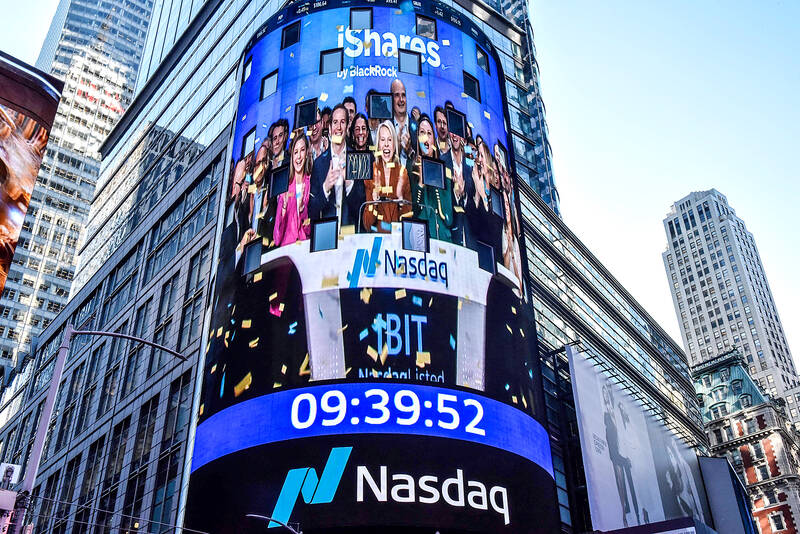The first US exchange traded funds (ETF) that directly hold bitcoin got off to a strong start, with billions of dollars changing hands in a historic first day of trading for the long-sought investment vehicles.
More than US$4.6 billion of shares were traded between nearly a dozen US spot bitcoin exchange-traded funds on Thursday. It was a much-anticipated debut that came a day after the US Securities and Exchange Commission (SEC) gave them the green light, following a campaign of more than a decade by the digital-asset industry.
The Grayscale Bitcoin Trust, which converted into an ETF, saw about US$2.3 billion in volume, Bloomberg data showed.

Photo: AFP
Meanwhile, BlackRock’s iShares Bitcoin Trust — IBIT — saw more than US$1 billion change hands.
“This is definitely ground-breaking,” Bloomberg Intelligence ETF analyst Athanasios Psarofagis said. “There was no doubt demand would be strong for these ETFs, but the numbers across the board are impressive.”
However, it is difficult to compare Thursday’s activity to any other day in ETF history. Typically, only one fund that tracks a new asset class begins trading on a single day. It is unprecedented to see more than 10 nearly identical funds all begin at once. However, even singling in on one ETF indicates the sheer magnitude of trading.
Bitcoin at one point on Thursday surged past US$49,000 to levels last seen in 2021 before falling back to US$46,075 as of 9:30pm in New York. Other major tokens were mixed as speculators took stock of the outlook.
The Grayscale Bitcoin Trust was the most heavily traded ETF debut on record. To be sure, the product has existed in its trust structure since 2013 and had a nearly US$27 billion headstart in asset size.
Trading volume does not indicate buying or selling or investor inflows. Because of the way the funds settle trades, net flows into or out of the products would have remained unknown until at least yesterday.
When the initial bitcoin futures fund began trading in 2021, it saw a turnover of almost US$1 billion during the first day. At the time, the futures fund debut was the second-most heavily traded fund on record.
Psarofagis added a caveat that much of the demand might come from so called “seed” money that is pre-arranged by the fund issuers. Signs of more organic demand, such as from retail investors or financial advisers, might come later on as more broker-dealers list the funds on their platforms.
However, there are still lingering questions. As with any ETF, it is unclear when major distribution platforms would choose to offer the spot bitcoin products. Yet to crypto bulls, the victory in many ways lies in the funds’ very existence.
“What an ETF represents for bitcoin adoption extends beyond the immediate inflows into these products, potentially reshaping the market in entirely unprecedented ways,” Coinbase Global Inc said in a report. “Nevertheless, we think this will take time to unfold.”
While fee wars are a common feature of the US$8 trillion ETF arena, the battle to lower costs broke out before the spot bitcoin ETFs launched. BlackRock, Ark Investment Management and Invesco were among the issuers who dropped their costs in the days leading up to Wednesday’s approval.

Semiconductor shares in China surged yesterday after Reuters reported the US had ordered chipmaking giant Taiwan Semiconductor Manufacturing Co (TSMC, 台積電) to halt shipments of advanced chips to Chinese customers, which investors believe could accelerate Beijing’s self-reliance efforts. TSMC yesterday started to suspend shipments of certain sophisticated chips to some Chinese clients after receiving a letter from the US Department of Commerce imposing export restrictions on those products, Reuters reported on Sunday, citing an unnamed source. The US imposed export restrictions on TSMC’s 7-nanometer or more advanced designs, Reuters reported. Investors figured that would encourage authorities to support China’s industry and bought shares

TECH WAR CONTINUES: The suspension of TSMC AI chips and GPUs would be a heavy blow to China’s chip designers and would affect its competitive edge Taiwan Semiconductor Manufacturing Co (TSMC, 台積電), the world’s biggest contract chipmaker, is reportedly to halt supply of artificial intelligence (AI) chips and graphics processing units (GPUs) made on 7-nanometer or more advanced process technologies from next week in order to comply with US Department of Commerce rules. TSMC has sent e-mails to its Chinese AI customers, informing them about the suspension starting on Monday, Chinese online news outlet Ijiwei.com (愛集微) reported yesterday. The US Department of Commerce has not formally unveiled further semiconductor measures against China yet. “TSMC does not comment on market rumors. TSMC is a law-abiding company and we are

FLEXIBLE: Taiwan can develop its own ground station equipment, and has highly competitive manufacturers and suppliers with diversified production, the MOEA said The Ministry of Economic Affairs (MOEA) yesterday disputed reports that suppliers to US-based Space Exploration Technologies Corp (SpaceX) had been asked to move production out of Taiwan. Reuters had reported on Tuesday last week that Elon Musk-owned SpaceX had asked their manufacturers to produce outside of Taiwan given geopolitical risks and that at least one Taiwanese supplier had been pushed to relocate production to Vietnam. SpaceX’s requests place a renewed focus on the contentious relationship Musk has had with Taiwan, especially after he said last year that Taiwan is an “integral part” of China, sparking sharp criticism from Taiwanese authorities. The ministry said

US President Joe Biden’s administration is racing to complete CHIPS and Science Act agreements with companies such as Intel Corp and Samsung Electronics Co, aiming to shore up one of its signature initiatives before US president-elect Donald Trump enters the White House. The US Department of Commerce has allocated more than 90 percent of the US$39 billion in grants under the act, a landmark law enacted in 2022 designed to rebuild the domestic chip industry. However, the agency has only announced one binding agreement so far. The next two months would prove critical for more than 20 companies still in the process